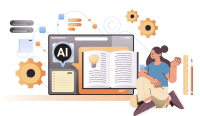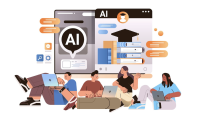Search
There are 45 results.
Category
Tag
Tag
All (45)
Active Learning (2)
Activities (1)
Annotated Bibliography (1)
Assessments (10)
Authentic Activities (3)
Canvas (2)
Case Studies (2)
Collaboration (2)
Communication (2)
Community (1)
Competency-Based Education (5)
Content Creation (4)
Course Materials (1)
Course Preparation (1)
Discussions (2)
Diversity (1)
Equity (1)
Faculty Support (1)
Feedback (9)
Formative Assessments (8)
Game-Based Learning (1)
Generative AI (5)
Grading (8)
Group Work (2)
Learning Objectives (2)
Multimodality (2)
Peer Review (1)
Presentations (2)
Rubrics (3)
Scaffolding (1)
Summative Assessments (1)
Third-Party Tools (1)
Workload (1)
Written Assignments (1)
Canvas Grading and Feedback: What Students See
Did you know that some forms of assignment feedback in Canvas are more obvious to students than others? Canvas has a Student View option for instructors to get a sense of what students are seeing in most general areas of their courses, but it can be challenging to determine what your actual students are experiencing when accessing your comments on their work or the rubric you’ve filled out for their submission.
Five Instructor Feedback Essentials
Providing student feedback is a key component of an instructor’s role and an important part of effective instruction. Research shows that ongoing feedback keeps students engaged and improves their morale, motivation, and learning (Best et al., 2015). Yet, providing high-quality feedback can be a time-consuming commitment, especially in courses with large class sizes or numerous written assessments. Instructors should keep in mind the tools, structure, and best practices that can help them provide feedback.
Introduction to Competency-Based Education
As higher education evolves to meet the needs of today’s diverse learners, competency-based education (CBE) is gaining traction for its student-centered approach and promises of affordability and workplace preparation. According to a 2020 survey, 128 unique institutions were operating a total of 1,057 CBE programs between 2018 and 2020, and 82% of responding institutions expected CBE programs to grow further between 2020 and 2025 (American Institutes for Research [AIR], 2021). While interest in CBE may be growing, most institutions remain in the early planning stages.
Developing AI Literacy Across the Curriculum: A Guide for Programs and Faculty
The rapid integration of AI into professional practice across disciplines makes AI literacy increasingly crucial, not just for technology-focused fields but for all areas of study. Even faculty who are skeptical of AI's value need to consider how it's transforming their disciplines. For example, scientific fields are seeing AI adoption in literature reviews, experimental design, and data analysis. In the humanities, AI tools are already being used for textual analysis, translation, and content creation. Creative disciplines must grapple with AI's impact on artistic production and copyright. Professional programs face increasing pressure from employers who expect graduates to understand AI applications in their field.
Integrating AI Into Assessments: From Policy to Practice
Conventional assessments, such as essays and multiple-choice questions, have long been the cornerstone of evaluating student performance. However, the widespread availability of generative AI (genAI) tools necessitates rethinking assessment methods. Now that genAI tools are readily accessible and rapidly improving, it is crucial to develop assessment approaches that maintain academic integrity while leveraging the benefits of AI to engage students and prepare them for the modern workforce (Yu, 2023).
Fostering Deep Learning and Motivation in the AI Era
As generative artificial intelligence (genAI) reshapes the educational landscape, faculty must rethink traditional assessment strategies to maintain academic integrity and real-world relevance. This piece explores strategies for creating effective assessments in an AI-mediated world, focusing on two key areas: collaborative activities that develop essential human skills, and formative assessments that emphasize personal growth and deep learning. These approaches not only address concerns about AI misuse but also prepare students for future workplaces where human capabilities will complement AI tools.
The Need to Rethink Assessments in the Age of Generative AI
The rapid advancement of generative artificial intelligence (genAI) technologies has sent shockwaves through the education sector, sparking intense debates about academic integrity, assessment practices, and student learning (Roe et al., 2023; Rudolph et al., 2023; Susnjak & McIntosh, 2024; Swiecki et al., 2022; Yeo, 2023). Since the public release of ChatGPT in November 2022, educators have grappled with concerns about cheating and the potential erosion of traditional academic values (Gorichanaz, 2023; Sullivan et al., 2023). However, as our understanding of genAI capabilities evolves, so too must our approach to assessment and teaching (Lodge et al., 2023).
Beyond Traditional Grades: Alternative Assessment Methods
As educators navigate the challenges and opportunities presented by generative AI (genAI), many are reconsidering traditional assessment approaches. Alternative assessment methods offer innovative ways to evaluate student learning that go beyond conventional grading systems, focusing on authentic learning, skill development, and meaningful engagement. These approaches not only address the challenges posed by AI but also align with research on effective learning and motivation (Furze, 2023; Pitts Donahoe, 2023).










